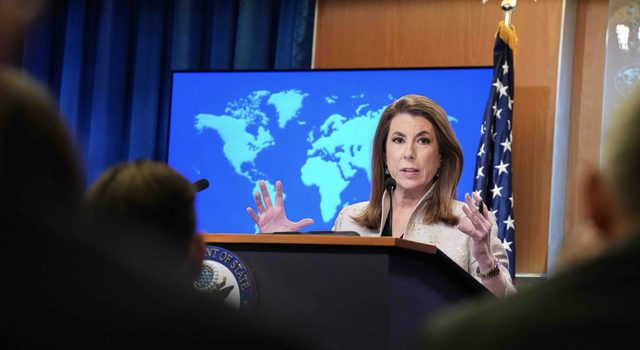
WASHINGTON DC – The US State Department on Tuesday delivered a stark message to Russia: President Donald Trump is serious about ending the war in Ukraine, and his demands for a ceasefire, now backed by an impending deadline for sanctions, should not be underestimated.
“Clearly, President Trump has proven that he should be taken seriously, because he’s a serious man, and we’ve seen the results of that around the world,” the State Department’s spokesperson Tammy Bruce told Kyiv Post’s correspondent during a daily briefing, referencing the administration’s recent diplomatic successes and commitments, particularly in the Indo-Pacific.
JOIN US ON TELEGRAM
Follow our coverage of the war on the @Kyivpost_official.
The spokesperson’s forceful comments came as Trump escalated pressure on Moscow.
On Monday, from Scotland, where he had been negotiating trade deals and visiting his golf resorts, Trump announced that Russia would face sanctions, including tariffs, within “10 or 12 days,” if it failed to make progress toward a ceasefire in Ukraine.
Speaking to reporters aboard Air Force One on Tuesday as he returned to the US, Trump clarified the deadline: “Ten days from today. Okay?” This means Moscow effectively has until Friday, August 8, to secure a ceasefire agreement.
This tight timeline marks a significant departure from his initial 50-day deadline, floated earlier in the month.
Other Topics of Interest
Trump Threatens Putin With Sanctions – Countdown Begins | Bohdan Nahaylo
Kyiv Post Chief Editor Bohdan Nahaylo weighs in on US President Donald Trump’s shortened ultimatum to Vladimir Putin – and what it could mean for the future of Russia’s invasion of Ukraine.
Trump explained the drastic cut by noting he had received no response from Moscow to his earlier overtures, leading him to conclude there was “no reason in waiting.”
The Kremlin has “taken note” of the new deadline, though Russian officials have previously dismissed such demands as “unacceptable.”
Frustration with Putin mounts
Bruce confirmed that a range of economic measures is being considered. “What’s been discussed regularly are sanctions, and the president also brought up the issue of sanctions, and even secondary sanctions, as certain countries are benefiting from buying Russian oil,” she said.
Secondary sanctions could mean severe financial penalties for nations continuing to do business with Russia.
Trump has also expressed growing frustration with Russian President Vladimir Putin, publicly questioning whether the Russian leader genuinely desires an end to the conflict.
“I always hang up, [and] say, ‘Well, that was a nice phone call,’” Trump recounted earlier in July, describing his conversations with Putin.
“And then missiles are launched into Kyiv or some other city, and I say, ‘That’s strange.’ And after that happens three or four times, you say, the talk doesn’t mean anything.”
This marks a notable shift from earlier this year, when Trump suggested Putin “wants peace.” Now, the president’s patience appears to have worn thin, especially after recent drone and missile strikes, which have killed at least 22 people across Ukraine, including in a prison.
“And then you know, we’re going to put on tariffs and stuff, and I don’t know if it’s going to affect Russia, because he wants to obviously probably keep the war going,” Trump said on the plane, seemingly referring to Putin.
“But we’re going to put on tariffs and the various things that you put on. It may or may not affect them, but it could.”
Trump added that he was not concerned about the potential impact of Russian sanctions on global oil markets, asserting that the US would simply boost domestic oil production to compensate.
“Time for misinterpretation is now over”
When pressed by a Kyiv Post reporter on why the administration would wait at all if there was no reason to, Bruce acknowledged the complex, multifaceted nature of international diplomacy.
“There’s, as we know, there are a million fronts in these kinds of dynamics. There’s negotiations that go on,” she explained, while declining to reveal specifics of the president’s private conversations.
“I would just trust that he’s the one who would know,” Bruce affirmed, assuring that the State Department stands ready to execute the president’s directives to resolve the situation.
“He has been patient, and that may have been misinterpreted by some people, and I think the time for misinterpretation is now over,” she concluded.





